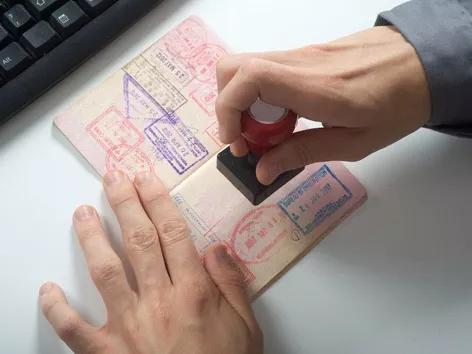Taxes in Italy for foreigners: how much should self-employed and freelancers be paid in 2024?
Table of contents
- Income tax in Italy for freelancers and self-employed persons
- Standard rates of income tax in Italy
- Unified tax system (forfettario regime)
- Registration in the taxation system for self-employed persons in Italy
- Tax credits and credits for Italian freelancers and the self-employed
- How to submit a declaration for self-employed persons in Italy?
- Social insurance for self-employed workers
- Penalties in Italy for non-payment of taxes

Italy has favorable tax options for freelancers and self-employed individuals. Many expats can count on a simplified taxation system when moving to the country. However, the state has approved certain rules and restrictions that must be followed. Find out what are the features of the taxation system in Italy for foreigners
Self-employment is quite popular in Italy. According to the World Bank, about 22% of workers in Italy are self-employed. The main advantage is that the taxation system is quite simple. Italian law requires freelancers and self-employed persons to file an annual tax return and pay income tax (IPREF or imposta sul reddito delle persone fisiche) on their income.
We tell you what taxes foreign freelancers will have to pay in Italy.
Income tax in Italy for freelancers and self-employed persons
Self-employed workers can own one of the following types of businesses in Italy:
- Sole proprietorship (ditta individuale) – created for self-employed entrepreneurs working in the field of sales.
- Freelancer (libero professionale) – this status is available exclusively to self-employed residents who carry out intellectual activities such as consulting, legal work or journalism.
No matter what type of business you choose, you will still need to file a tax return in Italy and pay income tax.
If you are opening a company in Italy for the first time, you need to decide on the tax regime. You either pay the standard tax rates (for employees) or use the forfettario regime, a single tax system introduced in 2015.
Standard rates of income tax in Italy
If you open a company in Italy that will pay standard tax rates, your income will be taxed progressively in three groups:
- Up to 28,000 euros - 23%;
- 28,001–55,000 euros – 35%;
- €55,001 and more – 43%.
If you choose the standard tax system, you can expect to be reimbursed for certain expenses when filing your tax return. You will also be able to take advantage of Italy's self-employed tax credit.
Self-employed workers in Italy who use the standard tax system can take advantage of the scheme for workers moving to Italy (lavoratori impatriati). It allows individuals to pay tax on only 30% of their income during the first five years of residence in the country. A lower rate of 10% is available in some regions.
Unified tax system (forfettario regime)
Expats starting a business in Italy can benefit from a tax rate of only 5% for the first five years. After five years, this indicator increases to 15%. However, you can also lower your bid even further. Each profession in Italy has an income code (ATECO - link in Italian) which determines what percentage of earnings will be taxed.
Requirements for participants:
- Your earnings should not exceed 85,000 euros.
- If you also work for an Italian employer, you must not earn more than 30,000 euros per year.
- You will not be entitled to tax under the simplified system if you earned more than 30,000 euros from your employer last year.
To access the flat rate scheme, you will need to select the forfettario mode when registering for a VAT number.
For more detailed information on the features of the flat rate system, visit the website of the Italian Tax Office.
You will need health insurance to safely move and find employment in a new country. You can issue an extended policy on our website using the link.
Registration in the taxation system for self-employed persons in Italy
In order to register to pay tax as a self-employed worker, you need to get a tax identification number. To do this, bring your passport and residence card to the immigration service of the local municipality or visit the police station.
Non-EU nationals must determine the structure of their business before they can register.
In addition, private entrepreneurs who regularly engage in business, agricultural, artistic or professional activities must obtain a VAT number in Italy (partita IVA).
To register as a VAT payer, you will need to submit the appropriate forms to the Italian tax agency.
Tax credits and credits for Italian freelancers and the self-employed
If you choose the standard tax system, you can offset some of the costs when you file your tax return. These are expenses related to the management of the company - rent of office premises, utilities and materials, as well as:
- Family tax allowance: a maximum of €1,220 for each child under the age of three, €950 for each child over the age of three, €800 for a dependent spouse and €750 for other dependents.
- Credit for medical expenses: 19% of incurred expenses over 129 euros.
- Credit for educational expenses: 19% of educational expenses in kindergarten, or up to 800 euros per year per child in school. University fees are fully deductible.
- Mortgage interest loan: 19% of paid mortgage interest, up to EUR 4,000.
How to submit a declaration for self-employed persons in Italy?
You must file a tax return every year. Regardless of whether you use standard or fixed rate, you will need to submit your Redditi PF tax form online by 30 November of the year following the tax year.
The Italian Government also charges VAT on goods consumed and services provided in Italy. The standard rate is 22%. VAT returns must be submitted once a year, between February 1 and April 30, 2024.
Social insurance for self-employed workers
Self-employed workers must pay social security contributions to the Italian Social Security Administration (INPS or Instituto Nazionale Previdenza Sociale). The amount of payments is different. If you are registered as a VAT payer but not entitled to a mandatory pension fund, you will need to pay social security contributions through a separate social security regime (gestione separata) at a rate of around 26%. Enrolled in the compulsory fund pay social contributions at a rate of about 24%.
Penalties in Italy for non-payment of taxes
- If you did not submit a tax return on time, you will have to pay a fine to the tax inspectorate in the amount of 250 to 1,000 euros.
- If you have underpaid the tax, you are responsible for the amount owed plus the fee. The commission ranges from 120% to 240% depending on the amount of the debt and late payment.
- Additional fines may be imposed on you if you do not declare foreign assets.
The Italian tax system favors the relocation of self-employed workers and freelancers, because it is aimed at business development. Therefore, moving here can be a good stage in the development of your company.
We will remind you! For permanent residence in Italy, a foreigner must obtain a residence permit. We have already told what types of permission exist and the features of the procedure for issuing the document in 2024.
Igor Usyk - Head of Migration department at VisitWorld
To ensure a safe move to a new country, I advise you to consult a specialist. My colleagues, qualified specialists with a legal education, will help you avoid unpleasant situations during migration.
Products from Visit World for a comfortable trip:
Checklist for obtaining a visa and necessary documents in Italy;
Legal advice on immigration to Italy;
Travel insurance for foreigners in Italy;
Medical insurance all over the world.
We monitor the accuracy and relevance of our information. Therefore, if you see any error or discrepancy, please write to our hotline.
Frequantly
asked questions
Can I work as a freelancer in Italy?
Is Italy suitable for self-employed people?
How to avoid double taxation in Italy?
Recommended articles
3 min
Expats
Do you want to live in Germany and work for yourself? It's easy! The country offers a German freelancer visa, which is equivalent to a temporary residence permit. Find out more about the benefits and procedure for obtaining a freelance visa in Germany
06 Aug. 2024
More details2 min
Work
Every fourth workplace in Italy is occupied by foreign workers: results of recent research
According to the EURES report, one in four jobs in Italy is held by migrant workers. Despite a significant influx of labor, the country is still experiencing a shortage of personnel in 37 professions. Find out more about the peculiarities of the labor market in Italy in 2024
19 Aug. 2024
More details3 min
Expats
Cost of living in Italy: expenses for housing rent, food, entertainment and budget for the month
Italy is a country with a high quality of life and a rich culture. Friendly population, developed transport infrastructure and high level of health care attract more and more expats here. Is it expensive to live in Italy? Find out the prices of accommodation, food, entertainment and more in Italy in 2024
17 Sep. 2024
More details2 min
Expats
Visa Run: what is this procedure and what are its advantages and disadvantages?
Visa Run is a way to extend your stay in the country simply by traveling abroad. It is quite popular among a certain category of expats. Find out what visa run is, how to extend the permit, and the advantages and disadvantages of this method
19 Oct. 2024
More detailsAll materials and articles are owned by VisitWorld.Today and are protected by international intellectual property regulations. When using materials, approval from VisitWorld.Today is required.
